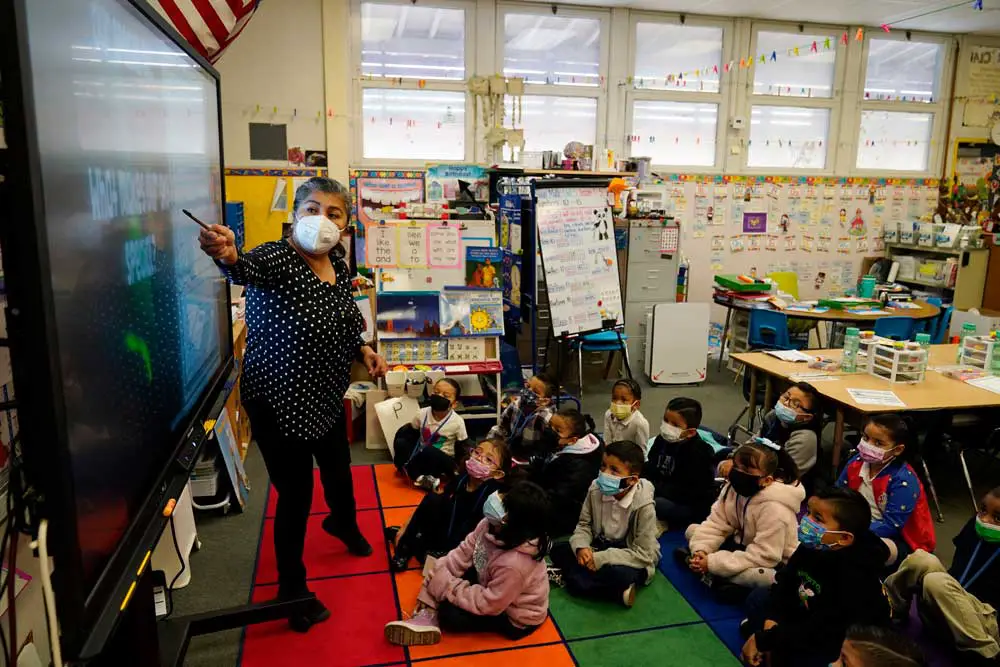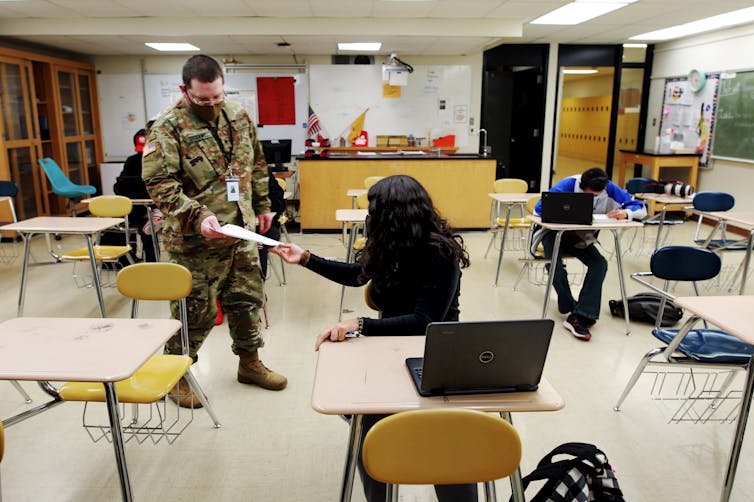
By Henry Tran and Douglas A. Smith
States have recently focused their efforts to reduce the nation’s teacher shortage by promoting strategies that “remove or relax barriers to entry” to quickly bring new people into the teaching profession.
California, for example, allows teacher candidates to skip basic skills and subject matter tests if they have taken approved college courses. New Mexico is replacing subject skills tests with a portfolio to demonstrate teaching competency.
Similarly, Oklahoma eliminated the Oklahoma General Education Test as a certification requirement. Missouri no longer looks at a prospective teacher’s overall grades – just the ones earned in select courses required to become a teacher. Alabama has moved to allow some who score below the cutoff scores on teacher certification exams to still get a teacher’s license, and Arizona’s education requirements for teachers now allow people without a college degree to begin teaching – so long as they are currently enrolled in college.
All of these efforts focus on recruiting new teachers, mostly by lowering requirements to make it easier for people to become certified to teach in public schools.
But these approaches do not address the actual causes of the nationwide teacher shortage. As we found doing research for our book “How Did We Get Here?: The Decay of the Teaching Profession,” college students who are interested in becoming teachers and current teachers agree: The root cause of the problem is a longstanding overall lack of respect for teachers and their craft, which is reflected by decades of low pay, hyperscrutiny and poor working conditions.
Disrespect to the profession is driving teachers away
Even before COVID-19 hit, teachers were leaving the profession at an increasing rate. In the late 1980s, annual teacher turnover was 5.6%, but it has grown to around 8% over the past decade.
The stress of teaching through a pandemic has been speculated to drive away even more teachers. About 1 in 6 teachers expressed that they would likely leave their job pre-pandemic, but this increased to 1 in 4 by the 2020-21 school year. While teachers continue to leave classrooms, fewer people are signing up to replace them.
In fact, the number of incoming teachers declined from 275,000 in 2010 to under 200,000 in 2020 and is projected to be under 120,000 by 2025. And even those staying on the job are so unhappy, many have been striking.
We found that the reasons teachers are leaving primarily revolve around the disrespect they and the profession consistently face. For example, teachers earn about 20% less than similarly educated professionals.
They also faced an escalating workload, even before the pandemic placed additional demands on their time, energy and mental health.
In addition, teachers have been experiencing diminishing control over what and how they teach. They are also regularly exposed to a continued tide of disrespectful student behavior and parental hostility, as highlighted by a survey of 15,000 educators that revealed a growing trend of students verbally and physically harassing teachers, as well as parents engaging in online harassment and retaliatory behaviors for teachers simply doing their jobs.
This overall lack of respect drives turnover from existing teachers and discourages potential teachers from considering the profession.
One college student told us, “I looked into teaching as a career pretty strongly … and every person I talked to, be it a grade school teacher or college professor, told me the same thing – that it was a lot of work, it was an unstable work environment, and the pay was very poor for the amount of work that you put in.” Unsurprisingly, she chose another career path.

AP Photo/Cedar Attanasio
The wrong solutions for the problem
A growing number of states have eliminated or have proposed to remove basic skills and subject matter exam requirements for teacher certification. Those prerequisites have long served as quality control checks for prospective teachers. While they do not guarantee effective teaching, they do serve as a minimum qualification threshold.
We believe efforts to loosen requirements for new teachers will bring more disrespect to the profession. History also suggests that they will make it so that schools that serve mostly students of color will have even fewer certified and experienced teachers than they already do.
But more directly, these efforts to boost teacher recruitment don’t address the reasons teachers are leaving the profession in the first place, which drive 90% of the demand for new teachers.
Lowering the standards to allow more people to enter the teaching profession may, for a short period, boost the number of people available to stand in front of classrooms. But that approach does not make teaching an attractive profession to consider, nor worthwhile for someone to stay and thrive in. Solving the teacher shortage problem requires solutions that reduce the numbers of teachers leaving the field and specifically address the lack of respect, low pay, hyperscrutiny and poor working conditions that they regularly endure.
![]()
Henry Tran is Associate Professor of Education Leadership at the University of South Carolina. Douglas A. Smith is Associate Professor of Education at Iowa State University.





























Timothy Patrick Welch says
I would hope a teachers motivation includes more than the pursuit of profit.
Since the reward is personal satisfaction.
Bethechange says
Amen.
Bartholomew says
The workload is nearly impossible to keep up with. It would be interesting to see the turnover our own county had. Also, how can an unqualified person come into the profession and be able to teach a class of say 20 students with what, maybe 12 ESE students? It’s not just a shortage of teachers, but there is a shortage of all personnel at schools.
Jimbo99 says
Uggghhhh, they want more money to build schools & educate children that the parents saddled the rest of us with that burden. Children, puppies & kittens are a lifetime commitment, if you can’t afford one, don’t create them.
Michael Cocchiola says
This is insane. Non or poorly-trained teachers will simply degrade this honorable and essential profession.
The first problem is that trained teachers know how to control a classroom. These rent-a-teachers will face chaos without the skills to bring order to 30 35 students who know incompetence when they see it.
But most egregious, students will not learn. Or if they learn anything it will come straight from a textbook – without context – and be quickly forgotten.
This is a sure disaster that we won’t know the full impact of until these kids come up against their European, Asian, Indian, and other global counterparts in competition for jobs.
Mary Fusco says
With all due respect, most of these problems begin at home. Kids are not taught any respect for anyone. That includes teachers. The students are the ones with the incompetence, not the teachers. How can a teacher possibly control a classroom when he or she has no backup by faculty or the parents of these kids. Everyone is afraid of stepping on toes. My 4 children all went to 12 years each of public school. Disrespect was not even entertained back in the day. One of my daughters has her degree in special education. In fact, she graduated from Flagler College . Some 20 years ago, when she started teaching, she told me, when you see the obnoxious behavior of the kids, then meet the parents, puzzle is solved. She left the profession. Teaching does not pay enough for what these men and women have to deal with daily. Just my opinion.
A.j says
Most of the teachers are women, most of the nation’s governing board are men. There is a big part of the problem, making rules for a profession you know little about. Low wages, a huge work load, not to have the proper equipment is a good recipe for high turnover rate. Not mention some of the students will fight the teachers.